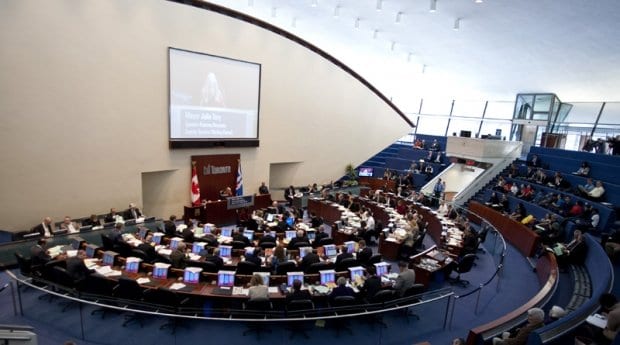I Alex Abramovich didn’t mind sitting in city council chambers for over 10 hours on Mar 11. The post-doctoral fellow at the Centre for Addiction and Mental Health, who has long advocated for space for LGBT people in Toronto’s shelters, was just happy to witness the passage of the 2015 Toronto city budget, which included a historic first for the city — shelter space set aside specifically for LGBT youth.
“After spending so many years fighting so hard for this I think that we’re all really happy to see these beds approved for LGBT youth,” Abramovich says.
The YMCA will run the first of two planned spaces for LGBT youth at Sprott House in the Annex neighbourhood.
According to Patricia Anderson, the manager of shelter, support and housing administration for the City of Toronto, Sprott House will operate a 25-bed transitional house. Referrals for the program will come primarily from Toronto’s emergency shelters. “The program will offer youth a chance to stabilize their lives, learn new skills, access education, employment and housing supports, all while living in a safe and supportive environment,” Anderson wrote in an email to Daily Xtra.
Another organization is currently in talks with the city to provide the second facility to serve LGBT youth, but Anderson says that agreement has not yet been finalized.
In February, city councillor Joe Mihevc told Daily Xtra that the city recognized the need for greater specialization in the shelter system. “We know that gay and lesbian youth can be vulnerable in shelters and are sometimes the victims of hate and violence,” Mihevc said at the time.
Shelter beds specifically for homeless LGBT youth were added to the proposed budget, along with two 24-hour drop-ins for women, which are to open in the east and west ends of the city, for a total increase of $7.9 million to the city budget.
The final city budget approved $600,000 for up to 54 shelter beds in 2015.
Jeanette Blair, the manager of Sprott House, says that they will make an announcement about the official opening of the space in the next several months.
She says that youths are looking for a place that is safe and where their sexual orientation and gender identity will be affirmed. According to her, the YMCA has a long history working with LGBT youth in its transitional housing services.
“We’re excited, thrilled and pleased to be part of this tremendous and historic opportunity,” Blair says.
According to a report from Covenant House, approximately 2,000 youth are homeless in Toronto on any given night. Further research has found that anywhere from 25 to 40 percent of homeless youth identify as a part of the LGBT community, though Abramovich previously told Daily Xtra that since many agencies don’t collect data on how many homeless youth are part of the LGBT community, it’s difficult to determine what that number might actually be.
The transitional housing space is a turning point for Toronto when it comes to dealing with LGBT youth homelessness, according to Abramovich. “I obviously don’t think that 54 beds is the solution to the problem — we have a lot more work to do,” he says. “But I think that this is a fantastic starting point.”
HG Watson can be reached at hg.watson@dailyxtra.com or @hg_watson on Twitter.


 Why you can trust Xtra
Why you can trust Xtra


